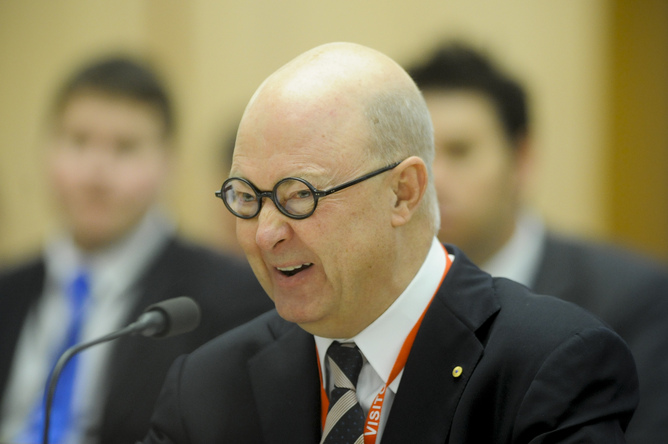
OPINION: Alexandra Wake argues that the Australian Federal government's Conroy’s clumsy handling of proposed reform, paired with the unrelenting campaign the major media companies have waged against it means a chance has been wasted to make news media fairer.
Anyone who has picked up Australia's biggest newspapers in the past week (and that of course includes the nation’s poll-fearing political powerbrokers) would naturally think Communication Minister Stephen Conroy’s apparently doomed media reforms presented a serious threat to Australia.
In the past week the newspapers, lead by Sydney’s Daily Telegraph, have put Conroy on the side of Stalin and News Limited on the side of the angels (and, today, Thomas Jefferson).
Fairfax has not been immune from demonising the reforms either.
As if the campaign on the front of the papers were not enough, the heads of Australia’s major media companies descended on Canberra yesterday to argue their case in Parliament.
At a parliamentary hearing in the Senate, Fairfax CEO Greg Hywood claimed the laws threatened our very democracy.
“The issue of deep principle is that regulation of the media should be the last resort of any democratic government,” he said.
News Limited CEO Kim Williams was more colourful, comparing the reforms to a 17th century instrument of British royal tyranny: “This is a modern-day Star Chamber,” he said. “No more, no less.”
Negative coverage
The unrelenting negative coverage presents us with a quandary. How can we trust the media to fulfil the valuable democratic role it is charged with when the major players cannot see past their own self-interest?
Crikey’s Cathy Alexander has been one of the few to expose the hypocrisy of the media reform coverage. Her simple content analysis of the coverage has, unsurprisingly, been flooded with negative articles and opinion pieces. She surveyed coverage across The Australian, The Daily Telegraph, the Herald Sun, The Age, The Sydney Morning Herald and the Australian Financial Review. Across the major daily papers, negative pieces on the reforms outnumber positive articles by 100 to 6.
It is clear we cannot trust the media to host a fair discussion of this policy in a way that explains the reforms that allows all sides to be aired. And if the media is not performing this function for the public, who will?
Few of today’s senior journalists working for News Limited and Fairfax appear to understand that freedom of the press comes with responsibilities. These responsibilities include balanced reporting underpinned by fairness, but the government’s attempt to legislate for this has been met with the most unbalanced of views which protect the significant commercial interests of a powerful few.
This is why we need a Public Interest Media Advocate: to represent for the general public in the face of these powerful media outlets.
Those of us who have worked for years under regulations at the ABC have found little to complain about. And increasingly, those within broadcast media are finding it hard to determine why newspapers should have a special case.
For those of us who believe that reform is necessary it is a sad time. Without the support of the independents in the lower house, the reforms seem destined to crash. And it’s hard to believe the government was that passionate about reform, given how hasty Conroy has been in trying to ram the legislation through caucus and Parliament.
No real freedom
It’s sad that so many of those who have evoked the words “press freedom” and “democracy” over the years have little intention of ensuring there is real freedom for Australia’s least powerful people – often women, children, indigenous people, migrant groups and people who by virtue of their sexuality are considered different. It is these people who suffer as a result of repeated failures of the big newspapers to apply appropriate fairness and ethics.
These reforms represent a wasted opportunity for Australia. Conroy’s clumsy handling of the legislation, paired with the unrelenting campaign the major media companies have waged against it means we have missed a chance to make our media fairer.
News Limited stables may cite Stalin, Mao, Castro and Thomas Jefferson in their fight against reform, but they might do well to look to German philosopher Jurgen Habermas, who argued so passionately for the “quality” of the public sphere.
For Habermas, civility of public discourse was central to democracy. It is a pity there isn’t more of that thinking around today.
Alexandra Wake is a lecturer at RMIT University, Melbourne. This article was originally published on The Conversation.
This work is licensed under a Creative Commons Attribution-NonCommercial 3.0 New Zealand Licence.




